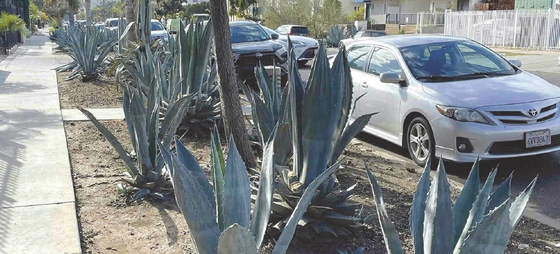
Cacti, large potted plants, and decorative stones are increasingly placed in flowerbeds in front of commercial buildings and apartments in Los Angeles as the number of incidents and accidents involving homeless people increases.
Recently, the management of a shopping center on Oxford Avenue in LA Koreatown planted eight cacti in a flowerbed between the street and the sidewalk. The adult knee-high cacti, unlike the existing grass, block the space for homeless people to set up tents.
“In the past, homeless people have pitched tents in the flowerbeds and used DWP’s electricity and water without permission, causing power outages,” says the mall management. “They also use drugs, so both customers and tenants felt unsafe. Six tents disappeared after spending hundreds of dollars to plant cacti.”
An apartment building at the corner of Westmoreland Avenue and Leeward Avenue, also known for its large homeless encampments, planted cacti in its street flowerbeds after the LA Sanitation & Environment conducted a routine cleanup of the encampments. A storefront at 3rd and Hobart Boulevard also planted cacti in its flowerbeds to prevent encampments from re-emerging.
These are just a few examples of the ongoing efforts to prevent homeless encampments from forming across the city. Some residents have raised their voices in favor of planting cacti, citing the negative effects coming from homeless people, such as loud noises, littering, frequent fights, and drug dealing. In particular, residents are taking action as they claim that the city of Los Angeles has been passive in removing homeless tents.
On the other hand, there are also criticisms of the inhumane practice of deliberately placing large pots and landscaping stones on sidewalks and under bridges where tent camps have formed. Ktown For All, a homeless community support organization, opposed and called the intentional blocking of homeless tent sites hateful.
On December 18, the LA Times reported in an article titled “The little-understood reason why clearing homeless encampments became harder in California than most other states,” that local and state governments in the West have fewer options after the series of rulings by the 9th Circuit Court of Appeals upheld the right to homelessness.
According to the LA Times, major cities in the state are arguing that the appeals ban on tearing down homeless encampments is backfiring.
For the past decade, Los Angeles and other cities have enacted ordinances to prevent homeless people from sleeping on the streets or staying in tents.
But after a lawsuit by homeless support groups, the 9th Circuit Court of Appeals ruled in 2006 that the city could not arrest homeless people for sleeping on the streets. In 2018, the 9th Circuit Court of Appeals declared that in Boise, Idaho, arresting or fining people for sleeping on the streets, when they had no other shelter, was a violation of the 8th Amendment’s prohibition of “cruel and unusual punishment.”
In July, the 9th Circuit Court of Appeals also denied a request to reconsider a ruling that prevented the city of Grants Pass, Oregon, from punishing homeless people for sleeping in public.
Because of the 9th Circuit’s decision, eight Western states, like California, can’t ban homelessness or take away tents.
BY HYOUNGJAE KIM, JUNHAN PARK [kim.ian@koreadaily.com]




